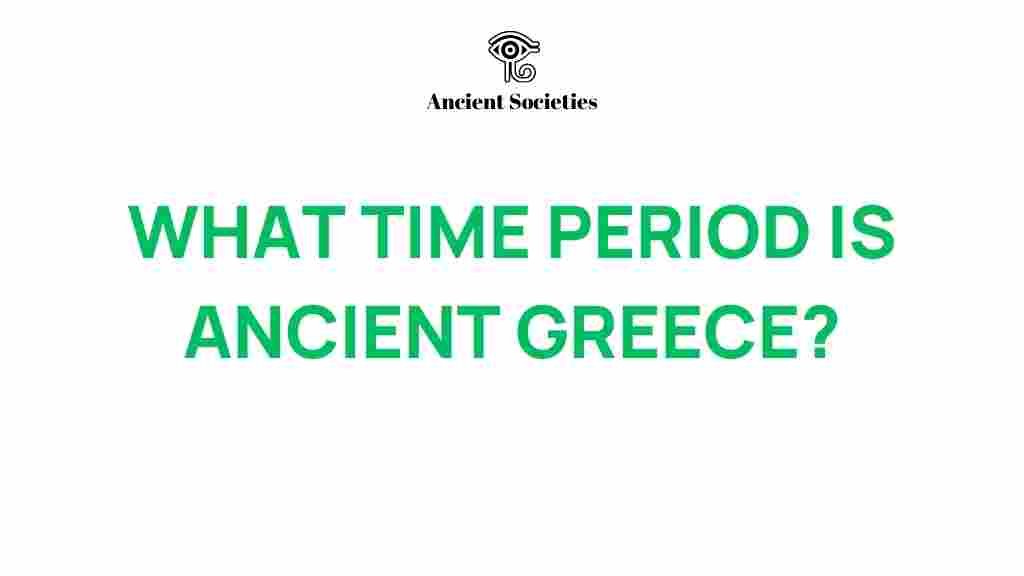Unraveling the Mysteries: What Time Period Defines Ancient Greece?
Ancient Greece is a pivotal chapter in the history of Western civilization, renowned for its profound influence on philosophy, politics, art, and science. Understanding the timeline and periods that define Ancient Greece is crucial for anyone interested in the rich tapestry of Greek civilization. This article delves into the various epochs of Ancient Greece, focusing on the Classical Era and the Hellenistic Period, exploring their significance and cultural heritage.
The Timeline of Ancient Greece
The history of Ancient Greece can be broadly divided into several key periods:
- Geometric Period (circa 900-700 BC)
- Archaic Period (circa 700-500 BC)
- Classical Era (circa 500-323 BC)
- Hellenistic Period (323-30 BC)
Each of these periods played a significant role in shaping the cultural and historical landscape of Ancient Greece.
1. The Geometric Period
The Geometric Period marks the rise of Greek art and the formation of city-states. Characterized by geometric designs in pottery and the emergence of the first written records, this period laid the groundwork for future developments in Greek civilization.
2. The Archaic Period
During the Archaic Period, the foundations of Greek political and social structures were established. This era saw the development of city-states (polis) and the introduction of democracy in Athens. Notable advancements in art and architecture, including the construction of temples and the creation of the kouros statues, defined this period.
3. The Classical Era
The Classical Era is often regarded as the pinnacle of Ancient Greece. This period, which lasted from approximately 500 to 323 BC, is marked by remarkable achievements in philosophy, drama, and governance. Key figures such as Socrates, Plato, and Aristotle emerged during this time, influencing Western thought profoundly.
Additionally, the Classical Era saw the construction of iconic structures like the Parthenon and the flourishing of theater, with playwrights like Sophocles and Euripides. Greek mythology also played a significant role in shaping the cultural identity of this period, with myths and legends being integral to education and societal values.
4. The Hellenistic Period
The Hellenistic Period began with the death of Alexander the Great in 323 BC and lasted until the Roman conquest in 30 BC. This era is characterized by the spread of Greek culture across a vast empire that stretched from Greece to Egypt and into Asia. The blending of Greek and Eastern cultures led to significant advancements in science, art, and philosophy.
During the Hellenistic Period, cities like Alexandria became cultural hubs, attracting scholars and artists. The works of philosophers such as Epicurus and the Stoics emerged, contributing to a rich intellectual legacy.
Archaeology and Ancient Greece
The study of Ancient Greece is heavily reliant on archaeology, which provides insights into the daily lives, cultures, and beliefs of the Greek people. Excavations of sites such as Delphi, Olympia, and Knossos have uncovered artifacts that reveal much about the social structures, religious practices, and artistic achievements of the time.
Some notable archaeological findings include:
- Pottery: Vases and amphorae that depict scenes from mythology and daily life.
- Sculptures: Classical sculptures that reflect the ideals of beauty and human form.
- Architecture: Remnants of temples and public buildings that showcase advanced engineering skills.
For more detailed archaeological insights, the Archaeological Institute of America offers extensive resources.
Mythology: The Soul of Greek Civilization
Mythology is an integral part of Ancient Greece, serving as both a religious practice and a means of explaining the natural world. Greek myths often feature gods and goddesses, heroes, and mythical creatures, each embodying various aspects of human experience and morality.
Key figures in Greek mythology include:
- Zeus: The king of the gods, ruler of Mount Olympus.
- Athena: The goddess of wisdom and warfare, often associated with the city of Athens.
- Hercules: A hero known for his strength and his legendary twelve labors.
These myths not only provided entertainment but also served to instill societal values and explain complex concepts within Greek civilization.
Cultural Heritage of Ancient Greece
The cultural heritage of Ancient Greece is vast and varied, influencing countless aspects of modern society. From democratic ideals to artistic expressions, the legacies of Ancient Greece continue to resonate today. Key contributions include:
- Democracy: The concept of government by the people, first practiced in Athens.
- Philosophy: The establishment of philosophical inquiry and ethics.
- Drama: The development of theater, which remains a cornerstone of literature and performance arts.
Understanding these contributions allows us to appreciate the depth and complexity of Ancient Greece, as well as its lasting impact on global culture.
Troubleshooting Common Misconceptions
As we explore the rich history of Ancient Greece, it’s essential to address common misconceptions that often arise:
- Misconception: Ancient Greece was a unified empire.
- Fact: Ancient Greece consisted of independent city-states, each with its own government and culture.
- Misconception: Greek mythology is purely fictional.
- Fact: Myths served as a way to explain the world and were deeply intertwined with religion and daily life.
Conclusion
In conclusion, the history of Ancient Greece is a fascinating journey through time, marked by significant periods such as the Classical Era and the Hellenistic Period. The archaeological discoveries and the rich mythology provide a window into the lives of the people who shaped this extraordinary civilization. Understanding Ancient Greece is not merely an academic pursuit; it is essential for appreciating the foundations of modern Western thought, governance, and cultural practices.
As we continue to explore and uncover the mysteries of Ancient Greece, we honor the legacy of its people and their enduring contributions to our world today. For those interested in diving deeper into the history of Ancient Greece, consider visiting the British Museum, which showcases artifacts and exhibits from this remarkable civilization.
This article is in the category History and created by AncientSocieties Team
